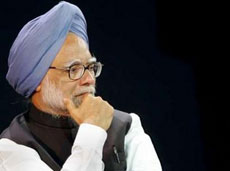|
India seeks trade pacts with China, Japan, S.Korea
(Reuters)
Updated: 2006-05-05 20:18
HYDERABAD, India - India is working on free trade agreements with China,
Japan and South Korea as part of a concerted effort to strengthen its regional
ties, Indian Prime Minister Manmohan Singh said on Friday.
India's "Look
East" policy is aimed at boosting manufacturing in Asia's third-largest economy,
raising its share of global trade and creating much-needed jobs for its
billion-plus people.

Indian Prime Minister Manmohan Singh attends a
seminar at the Asian Development Bank annual meeting in Hyderabad May 5,
2006. Singh said on Friday the government was working on free trade
agreements with China, Japan and South Korea.
[Reuters] | "India has a vital stake in the prosperity and
stability of Asia," Singh told the annual meeting of the Asian Development Bank
(ADB) in the southern Indian city of Hyderabad.
Trade pacts with China,
Japan and Korea would come on top of existing deals with Singapore, Thailand and
in South Asia, and Singh envisaged that one day a free trade area would cover
all major Asian economies, and possibly Australia and New Zealand.
Singh, seen as the father of India's economic reforms because he was
finance minister when its economy opened in the 1990s, sees more trade with its
neighbours as a way to raise the share of manufacturing in India's GDP from just
one-seventh now.
More people are moving off farms to seek work and Singh
wants the production lines to soak up this surplus labour as well as the 12
million Indians who join the workforce each year.
Japanese Finance
Minister Sadakazu Tanigaki later told the ADB meeting that Tokyo was committed
to boosting its solidarity with Asia and helping to tackle its development
challenges.
But protesters blame the ADB itself for some of Asia's
troubles. A few thousand from People's Forum Against ADB marched through
Hyderabad under the baking sun, denouncing the bank for imposing tough loan
conditions on governments and overriding the rights of the poor.
"ADB
leave India, leave Asia, leave the world," the members of more than 100 groups
chanted as vendors did a roaring trade in cool drinks and a small contingent of
police looked on.
"It's a development model that is committed to making
the world safe for corporate investment," said Shalmali Guttal of Focus on the
Global South.
"We're not against people borrowing to do projects, but
not under these conditions and not in this form and not with this serious lack
of accountability."
IMBALANCING ACT
Singh,
addressing the ADB meeting's hottest issue so far, called for a coordinated
effort to correct global imbalances and urged global financial institutions to
play an active role in the effort to prevent a sudden worldwide economic
downturn.
"The present level of global imbalance cannot be sustained
forever. It therefore calls for action both from countries which have current
account surpluses and those having current account deficits," he
said.
"Large disparities raise concerns about unsustainability and
provoke the fear of hard landings."
China said on Thursday it would push
yuan reform, as part of its long-term efforts to rebalance its economy by
raising domestic demand, but would not take orders from other countries.
Some economists say the United States is responsible for China's booming
exports, that it consumes too much and bears unsustainable current account and
fiscal deficits, but others charge that China keeps its exchange rate unfairly
cheap.
Tim Adams, U.S. Treasury undersecretary for international affairs,
told reporters on Thursday that all the Group of Seven rich countries had backed
a call for China to change its ways.
"All too often this is pitted as
this bilateral trans-Pacific food fight," Adams said. "When in fact it's the
world talking to China about what it should do to help minimise the risk of
disruptions and dislocations."
(For more biz stories, please visit Industry Updates) |
| |
|
| |
|
|
|
| Most Popular Stories in 48 Hours |
|
|
|
|